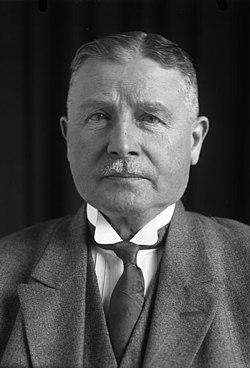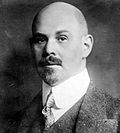Establishment and London Ultimatum
Joseph Wirth was minister of Finance under Chancellor Constantin Fehrenbach, whose cabinet resigned on the evening of 4 May 1921 due to its inability to agree on a new proposal for the payment of war reparations to present to the Allies. On 5 May the Allies issued what became known as the London Ultimatum, which demanded that by 11 May the German government accept the war reparations schedule and its total sum, punctually comply with disarmament according to the Treaty of Versailles and initiate trials of German war criminals. In the case of non-compliance, the Allies would occupy the whole Ruhr, Germany's industrial heartland. This would be in addition to measures already announced: the occupation of Düsseldorf, Duisburg and Ruhrort as well as financial sanctions in the form of a levy on German exports. [2]
It took the German parties until 10 May to decide on their positions towards the ultimatum. The left-wing Independent Social Democrats (USPD), the SPD and Centre Party favoured acceptance. The DDP was split and left the decision to its Reichstag delegates. Attempts by the SPD to win the USPD for a coalition failed because the latter refused to cooperate with the Centre Party. The Centre, readier than the SPD to accept the stipulations of the ultimatum, then tried to form a government including both the DVP and the SPD. Since the DVP had voted against the ultimatum, a consensus proved impossible. Among those discussed as possible chancellors were Gustav Bauer and Paul Löbe (both SPD), and Konrad Adenauer and Joseph Wirth (both Centre Party). [3]
On the evening of 10 May, Wirth was able to present his new (if incomplete) cabinet. The Foreign Ministry, the Ministry of Finance and the Ministry for Reconstruction were still vacant, with the former two temporarily led by Wirth. He issued a government statement that endorsed acceptance of the ultimatum. The Reichstag then voted 220 to 172 (with one abstention) in favour. In the night of 10/11 May, a note signed by Wirth stating the government's acceptance went out to the German embassies at London, Paris, Rome, Brussels and Tokyo. [3]
The government was based on parties that did not have a majority in the Reichstag (only 216 of 469 delegates were members of the three Weimar Coalition parties). However, a policy of compliance with Allied demands found the support of the USPD on the left. On the right, some DVP delegates voted to accept the ultimatum, signalling some support from that quarter as well. [3]
In office
The first Wirth government continued to take steps to comply with the Treaty of Versailles. Article 229 stated that "persons guilty of criminal acts against the nationals of one of the Allied and Associated Powers will be brought before the military tribunals of that Power". In 1920 it was agreed that the accused be tried before the German High Court in Leipzig. [5] The first trial, that of Karl Heynen, the warden of a prisoner of war camp, began on 23 May 1921. He was found guilty and sentenced to ten months in prison. [6]
Under the requirements of Article 88 of the Treaty of Versailles, the population of the ethnically mixed region of Upper Silesia held a referendum on 20 March 1921 to decide whether they wanted to remain in Germany or become part of the newly founded Second Polish Republic. Sixty percent of the voters opted to stay in Germany. The election results led Polish insurgents to start the Third Silesian Uprising, which was resisted by local Freikorps units. On 20 October, under a recommendation of the League of Nations, about a third of Upper Silesia's territory, half of the population and around 80% of its heavy industry was awarded to Poland. The decision raised a storm of protest in Germany. [7]
This page is based on this
Wikipedia article Text is available under the
CC BY-SA 4.0 license; additional terms may apply.
Images, videos and audio are available under their respective licenses.




